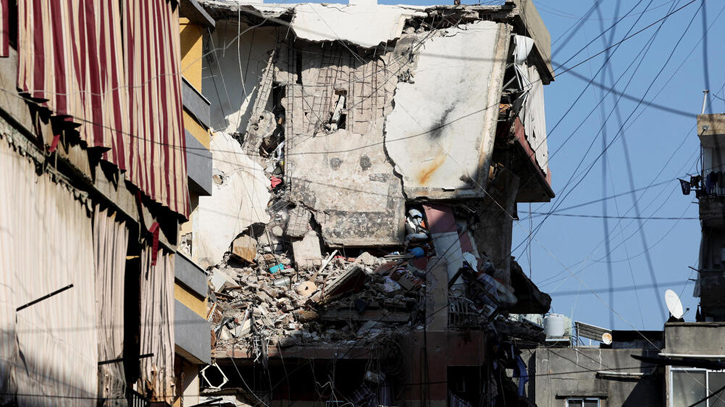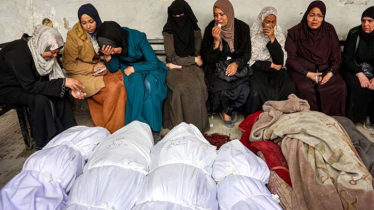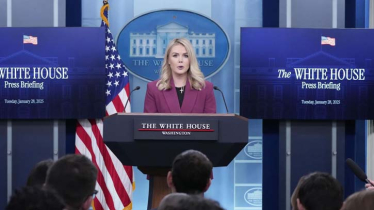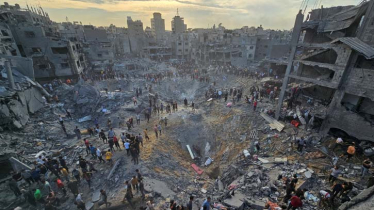
Photo : Collected
Israel killed a top Hezbollah commander Tuesday as part of a two-day bombing campaign that has left more than 560 people dead and prompted thousands in southern Lebanon to seek refuge from the widening conflict.
With the two sides on the brink of all-out war, Hezbollah launched dozens of rockets into Israel, including a longer-range projectile that set off air raid sirens in Tel Aviv and across central Israel. It was the group's farthest strike yet in nearly a year of exchanges. Israel said it intercepted the projectile, and there were no reports of casualties or damage.
Hezbollah said it had fired a ballistic missile at the headquarters of Israel's Mossad intelligence agency, which it said was responsible for the targeted killing of its senior leaders. Israel said it struck the site the missile was launched from in southern Lebanon.
Families that fled southern Lebanon flocked to Beirut and the coastal city of Sidon, sleeping in schools turned into shelters, as well as in cars, parks and along the beach. Some sought to leave the country, causing a traffic jam at the border with Syria.
Issa Baydoun fled the village of Shihine when it was bombed and drove to Beirut with his extended family. They slept in vehicles on the side of the road because the shelters were full.
“We struggled a lot on the road just to get here,” said Baydoun, who rejected Israel’s contention that it hit only military targets. “We evacuated our homes because Israel is targeting civilians and attacking them.”
Volunteers cooked meals for displaced families at an empty Beirut gas station that first became a hub for relief after a devastating port explosion in 2020.
Israel said late Tuesday that fighter jets carried out “extensive strikes” on Hezbollah weapons and rocket launchers across southern Lebanon and in the Bekaa region to the north.
Asked about the duration of Israel’s operations in Lebanon, military spokesman Rear Adm. Daniel Hagari said at a news conference that it aims to keep them “as short as possible, that’s why we’re attacking with great force. At the same time, we must be prepared for it to take longer.”
Tensions between Israel and the Lebanese militant group Hezbollah have steadily escalated over the last 11 months. Hezbollah has been firing rockets, missiles and drones into northern Israel in solidarity with Palestinians in Gaza and its ally Hamas, a fellow Iran-backed militant group.
Israel has responded with increasingly heavy airstrikes and the targeted killing of Hezbollah commanders while threatening a wider operation.
The U.N. Security Council scheduled an emergency meeting on Lebanon for Wednesday at the request of France.
Israel said a strike in Beirut Tuesday had killed Ibrahim Kobeisi, who it said was a top Hezbollah commander with the group’s rocket and missile unit. Military officials said Kobeisi was responsible for launches towards Israel and planned a 2000 attack in which three Israeli soldiers were kidnapped and killed. Hezbollah later confirmed his death.
It was the latest in a string of assassinations and setbacks for Hezbollah, the strongest political and military actor in Lebanon and widely considered the top paramilitary force in the Arab world.
Lebanon’s Health Ministry said six people were killed and 15 were wounded in the strike in a southern Beirut suburb, an area where Hezbollah has a strong presence. The country’s National News Agency said the attack destroyed three floors of a six-story apartment building.
The U.N.’s High Commissioner for Refugees in Lebanon said one of its staffers and her young son were among those killed Monday in the Bekaa region, while a cleaner under contract was killed in a strike in the south.
Hezbollah said its missile attacks Tuesday targeted eight sites in Israel, including an explosives factory in Zichron Yaakov, 60 kilometers (37 miles) from the border. It fired 300 rockets, injuring six soldiers and civilians, most of them lightly, according to Hagari, the Israeli military spokesman.
Messenger/UNB/Disha








